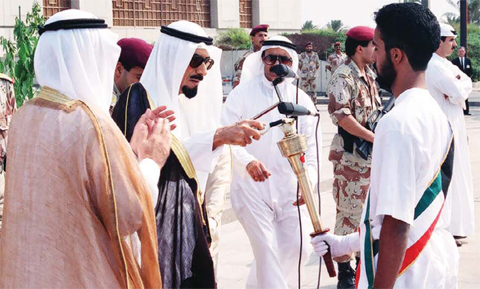 KUWAIT: This file photo taken on August 24, 1991 shows His Highness late Amir Sheikh Jaber Al-Ahmad Al-Jaber Al-Sabah lighting a torch to signify the resumption of education in all the country’s schools following the country’s liberation from Iraqi invasion. — KUNA
KUWAIT: This file photo taken on August 24, 1991 shows His Highness late Amir Sheikh Jaber Al-Ahmad Al-Jaber Al-Sabah lighting a torch to signify the resumption of education in all the country’s schools following the country’s liberation from Iraqi invasion. — KUNAKUWAIT: The 25th anniversary of His Highness late Amir Sheikh Jaber Al-Ahmad Al-Jaber Al-Sabah lighting of a torch to announce resumption of education in all the country's schools following the country's liberation from Iraqi invasion back in 1991 falls today. From August 24, 1991 till now, Kuwait has been working hardly to boost and develop the field of education with all possible means.
As Kuwait celebrates its liberation from the Iraqi invasion in February 26, 1991, the country exerted all possible efforts to reconstruct and develop all educational domains. Kuwait considers education as one of the most important factors as the total spending on education has reached KD 1.7 billion which makes 9.5 percent of the state's expenditures.
Education in Kuwait in the past relied heavily on the Arabic language, basic mathematics and Holy Qur'an in simple classrooms called 'Katateeb.' The first formal school in Kuwait was 'Al-Mubarakeyah' which was founded in 1911, and later came 'Al-Ahmadeyah' school which was established in 1921. In 1953, the first high school for males was founded in 'Shuwaikh' area, while the first high school for females was established in 'Al-Merqab' area.
The largest university in the country is Kuwait University which has over 1, 500 faculty members and approximately 30,000 students. There are also a number of private universities such as American University of Kuwait (AUK) and Gulf University for Science and Technology (GUST) and others.
The public school system is undergoing a revamp due to a project in this regard in conjunction with the World Bank. In April 2013, the Kuwaiti government partnered with the World Bank to launch a pilot project in 48 schools across the state called the National Curriculum Framework. The curriculum is set to be implemented in the next two or three years. The Kuwaiti government sends many citizens to universities in the United States, United Kingdom, Germany and other countries.










